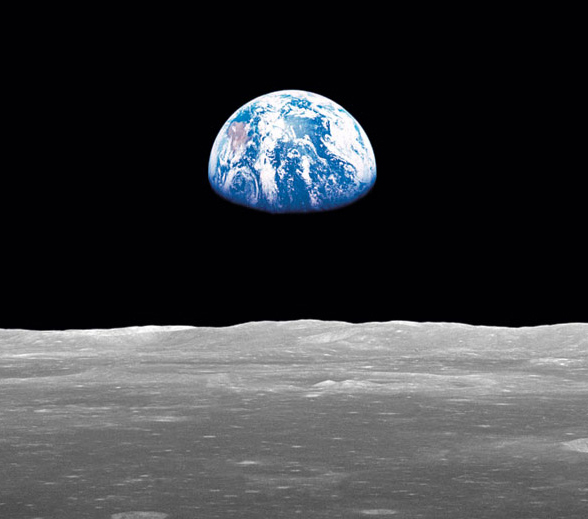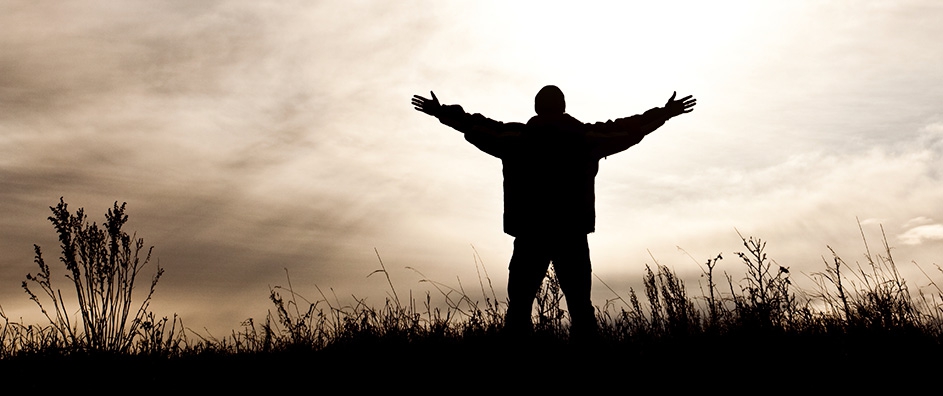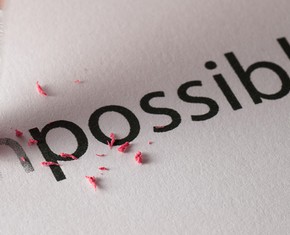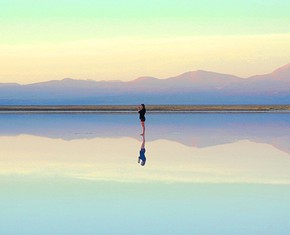The views expressed in our content reflect individual perspectives and do not represent the authoritative views of the Baha'i Faith.
If we want to grow spiritually, we naturally try to widen our vision, look for higher truths and begin to abandon the consciousness of separateness. Only when the spiritual wayfarer frees himself from the bondage of his own selfish limitations can he find real freedom. Sometimes that freedom from limitations comes about through a consistent practice of search, meditation and prayer, and sometimes it comes about in a swift moment of insight.
During Apollo 14 astronaut Edgar Mitchell’s return from the moon in 1971, he had a profound spiritual realization while looking out the window of his spacecraft, and it changed his entire life. Now known as “the overview effect,” multiple astronauts and cosmonauts have reported this kind of surprising, sudden shift of their spiritual awareness during their time in space:
Instead of an intellectual search, there was suddenly a very deep gut feeling that something was different. It occurred when looking at Earth and seeing this blue-and-white planet floating there, and knowing it was orbiting the Sun, seeing that Sun, seeing it set in the background of the very deep black and velvety cosmos, seeing–rather, knowing for sure–that there was a purposefullness of flow, of energy, of time, of space in the cosmos–that it was beyond man’s rational ability to understand, that suddenly there was a nonrational way of understanding that had been beyond my previous experience. There seems to be more to the universe than random, chaotic, purposeless movement of a collection of molecular particles. On the return trip home, gazing through 240,000 miles of space toward the stars and the planet from which I had come, I suddenly experienced the universe as intelligent, loving, harmonious.
 Many of us have felt something like what Ed Mitchell felt—a sense of unity and harmony. We can feel it in meditation, during our dreams, in our more spiritual moments, when we fall in love, when we see the overwhelming beauty of creation. That sense of connectedness and oneness—called savikalpa samadhi by the Hindus, meaning a temporary dissolution of the individual consciousness into an encompassing awareness of the whole—gives us a glimpse of the truly unified reality of all living things.
Many of us have felt something like what Ed Mitchell felt—a sense of unity and harmony. We can feel it in meditation, during our dreams, in our more spiritual moments, when we fall in love, when we see the overwhelming beauty of creation. That sense of connectedness and oneness—called savikalpa samadhi by the Hindus, meaning a temporary dissolution of the individual consciousness into an encompassing awareness of the whole—gives us a glimpse of the truly unified reality of all living things.
The great Faiths tell us that our separate selves are only an illusion. All of the myths and scriptural tales of self-enforced solitude in the wilds of nature or imprisonment in the belly of the whale–these stand for the isolation of the self. They symbolize our singleness, apartness, and separation. In order to continue our growth and move past the primary stages of search, our human condition requires that we transcend the first valleys, going beyond self so we can turn our attention toward others, to the universe and to our Creator.
At this new stage of maturation and development, that inner self we have spent so much time and energy discovering can become a hindrance to further growth. When that occurs, our path changes. Seekers must battle past such a hindrance, because the path stops here unless the seeker can overcome the urge to stay fixated on the self. Discovering the self demands an actively searching mind, heart, and spirit—but once read and understood, the book of self requires going past the limitations of the self:
The afflictions which come to humanity sometimes tend to center the consciousness upon the limitations. This is a veritable prison. Release comes by making of the will a door through which the confirmations of the spirit come. – Abdu’l-Baha, Divine Philosophy, p. 22.
…if you look with a subtle vision, shielding your gaze from seeing numbers and plurality and looking to the greater vision of oneness, you would leave the deadly desert of limitation and attain the shore of the ocean of unity. – from a provisional translation of Abdu’l-Baha’s I Was a Hidden Treasure.
In a self-centered and narcissistic society, growing past the self can seem problematic and frightening. Many Westerners get stuck at this stage of maturation. Those who undergo psychiatric or psychological counseling, especially long courses of Freudian therapy, often spend a great deal of time and energy at the self-discovery stage, and as a result sometimes have difficulty moving past it. Of course, some people require long-term therapy, but treating psychology as our contemporary religion misses the point. To worship at the altar of never-ending self-discovery can ultimately fixate and delay our growth.
The prophets say that the path to “Who am I?” ends in the realization that “I” limits us. Ken Wilber and many other transpersonal philosophers have written at length about this important realization:
So when you say ’my self’, you draw a boundary line between what is you and what is not you. When you answer the question, ’Who are you?’ you simply describe what’s on the inside of that line… All answers to that question, ’Who am I?’ stem precisely from this basic procedure of drawing a boundary line between self and not-self. The most interesting thing about this boundary line is that it can and frequently does shift. It can be re-drawn. In a sense, the person can re-map his soul and find in it territories he never thought possible, attainable, or even desirable. The most radical re-mapping or shifting of the boundary line occurs in the experiences of the supreme identity, for here the person expands his self-identity boundary to include the entire universe. We might even say that he loses the boundary line altogether, for when he is identified with the ’one harmonious whole’ there is no longer any outside or inside, and so nowhere to draw the line. – No Boundary, p. 5.
Self-transcendence scares some people, especially those who have spent a long time struggling for inner awareness in the valley of self. But transcending your self doesn’t mean losing yourself, or immersing the self in some huge impersonal ocean of no-identity. Instead, transcending the self means moving to the next stage of your spiritual development and growth.
















Comments
Sign in or create an account
Continue with Googleor